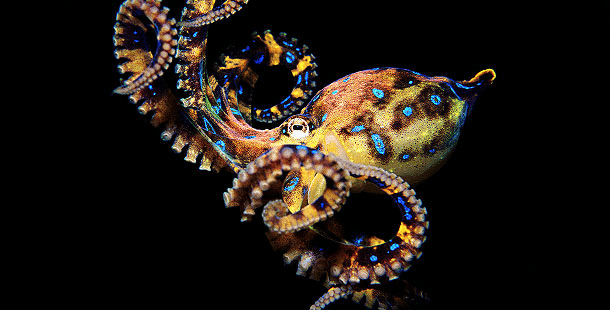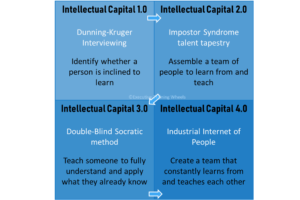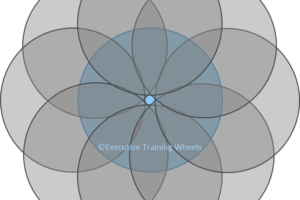The Octopus and the Executive
This post contains way more information than you ever wanted to know about octopuses. It then uses that information to make some points about executive leadership.
What do an executive and an octopus have in common? Surprisingly more than you might think. But first, let’s start with the differences. About 70 million years ago, Tyrannosaurus Rex roamed the earth, and it was another 80 million years before that when Stegosaurus lived. Compare that to the roughly 500-600 million years it’s been since the most recent common ancestor of humans and octopuses. Starting with something roughly the equivalent of a leech, humans and octopuses have independently evolved eyes, brains, and limbs. Imagine how different our inner workings must be!
That’s true for plenty of invertebrates, so why care about octopuses? Octopuses are extreme outliers among invertebrates for the size and complexity of their nervous systems. Many species of octopus have around 500 million neurons, which by that metric puts them on par with dogs. They have separate short and long-term memories, like us. They sleep, unlike large swaths of less intelligent animals. They can recognize individual humans, even when dressed identically. They are among the most notorious aquarium escapees, and they time their hijinks with when no one is looking. Many species of octopus even use tools. One octopus in New Zealand has learned to take photos of its visitors with a specially-housed digital camera, taking care to keep its tentacles out of the shot. Numerous researchers have called octopuses to the closest things to intelligent alien life we’re ever to likely to meet.
They get weirder still. Scientists recently were able to map some octopus genomes. Turns out, they have the largest genomes among invertebrates, roughly on par with house cats. They have about 50% more genes than humans do. They routinely edit their RNA as a shortcut past genetic mutation, allowing their nervous systems to work in extreme variations in temperature. They can even regrow lost limbs with no permanent loss of function.
What’s the point?
The point so far is that as intelligent creatures, octopuses and humans could hardly be more different. To think like an octopus would be unfathomably alien to most people. And that’s before the most ridiculous twist of all: the majority of octopus neurons are in their limbs, not their brain. Despite having a surprisingly large and complex brain, roughly two thirds of octopus neurons are spread elsewhere throughout their body.
We’re not just talking about simple nerves here. The nervous system inside an octopus tentacle is complex enough to form a recurrent neural net, which some researchers believe gives each tentacle its own independent short-term memory. The complex neural system in an octopus’s tentacle allows each limb to make decisions based on stimuli without consulting the brain. The limbs can even communicate with each other while entirely bypassing the brain.
Could you imagine what it would be like to have your limbs able to make independent decisions, and to coordinate together, without consulting your brain? How do octopuses get anything done if they aren’t even the decision makers in their own body?
Researchers set out to answer that question. They already knew octopuses could solve fairly complex puzzles, including unscrewing jars from the inside. When an octopus meets a new person, it will often slowly reach out a single tentacle to wrap around the person’s finger and examine them. Side note: octopuses can taste and smell with their tentacles. Their behavior when meeting people indicates octopuses must have the ability to impose some level of central control on their limbs.
To test this explicitly, researchers designed experiments where a treat was suspended in a clear maze. To get the treat, the octopus would have to direct a tentacle out of the water, where the tentacle would lose its taste and smell. It would have to rely entirely on its eyesight and central brain to direct the tentacle through the maze to the treat. Six of seven octopuses presented with this test passed. Their eyes and brain control the overall path of the tentacle while the tentacle does its own investigating, fine-tuning the search and identifying blockers or corners.
What does this have to do with executives?
Octopuses are able to successfully operate at multiple points on the spectrum from centralized control to decentralized control. The vision comes from their eyes and central brain, which guides the tentacles’ paths to reach their goal. The tentacles provide finer-level feedback to the brain, filtering the information they send back to just what’s relevant for the central brain to know. The tentacles also communicate with each other to allow fast, graceful movement.
This is remarkably analogous to what executives do. Executives lead teams whose collective intelligence exceeds their own. In repeated situations, executives choose points on the spectrum of centralized to decentralized decision-making. Executives set the vision and guide their team members to reach common goals. The members of the team provide finer-level feedback to the executive, choosing what to share at any given time. In any strong team, the members also communicate with each other and coordinate the broader team’s moves.
As an executive, you are in a position to see things that the rest of your team can’t. Even though you rely on your team to make smart choices, you need to provide the overall strategy and vision. Think of the octopus’s central brain and eyesight as a biological illustration of the importance of starting with why.
The type and level of coordination required to run a high-performing team with independently empowered decision-makers is unnatural to most people. This is a large part of why strong executive leadership is so rare. It requires forcing our human brain to operate with alien intelligence. I believe that with time and effort, this ability can be developed. Nearly every octopus tested has solved mazes when forced into human-like centralized thinking. Surely, we humans can learn to adapt their thinking methods to successfully operate decentralized intelligent teams.
To be fair, executives do face one major hurdle that the octopuses do not. Despite its decentralized intelligence, an octopus is still one organism. Any given tentacle does not need to worry whether another limb is out for itself or has the octopus’s best interest in mind. Even though it can lose and regrow limbs if needed, the octopus will still behave in such a manner as to preserve its existing limbs where possible.
When comparing an octopus to an executive or a high-performing team, the importance of trust within and among the team stands out clearly. The executive must operate in such a manner that the team members know they can unquestioningly trust their leader. Each member of the team must likewise know that all other members have the overall team’s best interest at heart. The team members must also be empowered and encouraged to communicate with each other. Only then can they make appropriate decisions to execute the executive’s vision when the executive’s attention is elsewhere.



